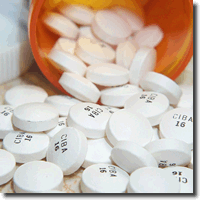About Drug Addiction
- Teen Drug Addiction
- Understanding Drug Addiction
- Effects of Drug Addiction
- Dangers of Drug Addiction
- Stages of Drug Addiction
- Signs of Drug Addiction
- Drug Addiction Withdrawal
- Drug Addiction Relapse
- Drug Addiction Facts
- Drug Addiction Overdose
- Drug Addiction Help
- Drug Addiction Intervention
- Drug Addiction Detox
- Drug Addiction Treatment
- Drug Addiction Rehab
- Drug Addiction Counseling
- What is a Drug Addict
- Drug Addiction Information
- Drug Addiction Statistics
- Drug Addiction Testing

Ritalin Addiction
 Ritalin addiction is not uncommon for those who abuse the drug because of its stimulant properties. However, in recent years there have been reports of Ritalin addiction by people for whom it is not prescribed. Ritalin (Methylphenidate) is a medication prescribed for individuals (usually children) who have an abnormally high level of activity or attention-deficit hyperactivity disorder (ADHD). According to the National Institute of Mental Health, about 3 to 5 percent of the general population has the disorder, which is characterized by agitated behavior and an inability to focus on tasks. Ritalin also is occasionally prescribed for treating narcolepsy.
Ritalin addiction is not uncommon for those who abuse the drug because of its stimulant properties. However, in recent years there have been reports of Ritalin addiction by people for whom it is not prescribed. Ritalin (Methylphenidate) is a medication prescribed for individuals (usually children) who have an abnormally high level of activity or attention-deficit hyperactivity disorder (ADHD). According to the National Institute of Mental Health, about 3 to 5 percent of the general population has the disorder, which is characterized by agitated behavior and an inability to focus on tasks. Ritalin also is occasionally prescribed for treating narcolepsy.
This drug is abused for its stimulant effects: appetite suppression, wakefulness, increased focus/attentiveness, and euphoria. Ritalin works by increasing the dopamine output in the brain, which helps to improve concentration. Dopamine is also the neurotransmitter very much associated with reward and pleasure in the brain, and for this reason when Ritalin is taken in higher than recommended amounts it can result in euphoria. Anything that causes a psychotropic reaction (a high) can result in a psychological addiction, and Ritalin is no different.
Ritalin addiction seems to occur when it induces rapid increases of dopamine in the brain. In contrast, the therapeutic effect is achieved by slow and steady increases of dopamine, which are similar to the natural production by the brain. The doses prescribed by physicians start low and increase slowly until a therapeutic effect is reached. That way, hypothetically the risk of Ritalin addiction is very small.
Ritalin is a central nervous system (CNS) stimulant. It has effects similar to, but more potent than, caffeine and less potent than amphetamines. It appears to have a notably calming effect on hyperactive children and a "focusing" effect on those with ADHD. Because of its stimulant properties, however, in recent years there have been reports of abuse of Ritalin by people for whom it is not a medication. When abused, the tablets are either taken orally or crushed and snorted. Some abusers dissolve the tablets in water and inject the mixture - complications can arise from this because insoluble fillers in the tablets can block small blood vessels.
At their June 2000 meeting, members of NIDA's Community Epidemiology Work Group (CEWG) shared the following information: The abuse of Ritalin has been reported in Baltimore, mostly among middle and high schools students; Boston, especially among middle and upper-middle class communities; Detroit; Minneapolis/St. Paul; Phoenix; and Texas. When abused, methylphenidate tablets are often used orally or crushed and used intranasally. In 1999, 165 Ritalin-related poison calls were made in Detroit; 419 were reported in Texas, with 114 of those involving intentional misuse or abuse. On Chicago's South Side, some users inject Ritalin (this is referred to as "west coast"). Also, some mix it with heroin (a "speedball") or in combination with both cocaine and heroin for a more potent effect.
Because stimulant medicines such as Ritalin do have potential for abuse, the U.S. Drug Enforcement Administration (DEA) has placed stringent, Schedule II controls on their manufacture, distribution, and prescription. For example, DEA requires special licenses for these activities, and prescription refills are not allowed. States may impose further regulations, such as limiting the number of dosage units per prescription.
Today, there are two reasons Ritalin addiction seems to be on the increase. The first is that it is manufactured as a pharmaceutical and those unwilling to try street drugs might think it is safer. The second is the rise in legitimate prescriptions for the drug. As the number of patients receiving the drug goes up, more is available for diversion into the illegal supply. This is one of the many drugs purchased through Internet pharmacies for illegitimate reasons.
Abusers may use Ritalin for purposes other than entertainment. Ritalin addiction sometimes comes when people take it to stay awake (for study or a job) or to lose weight. Ritalin, because it has stimulant effects, does work in the short term for these conditions. Another path to Ritalin addiction comes when users take the drug in order to alter their response to alcohol. A teen or young adult who wants to drink heavily may use Ritalin to stay awake and avoid passing out. This is a particularly dangerous practice that can lead to fatal alcohol poisoning.
Drug Addiction
- Alcohol Addiction
- Adderall Addiction
- Ativan Addiction
- Cocaine Addiction
- Crack Addiction
- Ecstasy Addiction
- Heroin Addiction
- Lortab Addiction
- Marijuana Addiction
- Meth Addiction
- Methadone Addiction
- Morphine Addiction
- OxyContin Addiction
- Percocet Addiction
- Ritalin Addiction
- Vicodin Addiction
- Xanax Addiction
